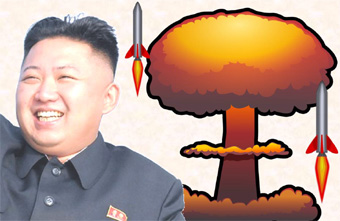
Photo composition by Thursday Review staff
North Korea Claims Hydrogen Bomb Test
| published January 6, 2016 |
By R. Alan Clanton, Thursday Review editor
North Korean officials announced that the country's military tested a small hydrogen bomb early on Wednesday, raising concerns about the rogue nation’s intentions in the region, but also raising the eyebrows of skeptics who say that the isolated country is far short of the technology needed to have successfully developed such an advanced weapon.
The hydrogen device was detonated at 10:00 a.m. Pyongyang time, according to the state run television network, KCNA. The explosion coincided with reports in the Pacific region of a minor earthquake, a tremor which registered 5.1 on the U.S. Geological Survey scale. The tremor was also detected and measured in South Korea and in China.
According to officials in Pyongyang, the device—detonated underground—contained a yield of roughly six kilotons, which would be the same size as the device last tested by North Korea in 2013. Both tests would be in direct violation of United Nations guidelines on nuclear testing, though North Korea dismisses such concerns. The USGS says that the epicenter of the tremor appears to be the same site used by North Korea for some of its previous weapons tests. Geological agencies in Japan and South Korea also said the event was measured in those countries.
Governments in Japan, South Korea, the Philippines and China all expressed concern for the reports of the detonation. China, North Korea’s only marginal ally in the region, expressed official condemnation over the test, and said it was “resolute” in its opposition to North Korea experimenting with such weaponry. Chinese officials lodged concern that such testing could have implications for people living north of the Yalu River, the wide waterway which divides China from North Korea, and across which radiation may drift.
Wednesday’s explosion marks the fourth time North Korea has detonated a nuclear device, but the first in which the country said a hydrogen device was used. Weapons experts question, however, the claim that the bomb was a miniaturized by-the-book “hydrogen” bomb. Some military analysts believe that though the bomb may have contained hydrogen, the device tested on Wednesday was a hybrid-type weapon—something short of the much more powerful fusion-type bomb capable of delivering widespread destruction.
The fact that North Korea characterized the device as miniature also offers a clue that it may be developing the smaller hydrogen bomb for tactical use, or as a weapon to be placed atop medium-range missiles or smaller battlefield rockets. If the test proves to have yielded genuine results, it would clearly alter the military thinking and defense posture of the U.S. and its closest allies in the Pacific region, including Japan, South Korea, and the Philippines. A few hours after the test was confirmed, Japanese Prime Minister Shinzo Abe made a statement condemning North Korea’s actions.
“North Korea’s nuclear test is a serious threat to our nation’s security,” Abe told journalists, “we absolutely cannot tolerate it, [and] we strongly denounce it.”
As of early Wednesday, the White House declined to confirm the report or offer direct comment on the detonation, but stressed that the United States would continue to defend its allies and partners in the region.
The development may also disrupt the tenuous relationship between China and North Korea. China, though in theory an ally of North Korea since the end of the Korea conflict, nevertheless opposes a heavily armed North Korea—especially one able to deliver nuclear warheads into neighboring countries.
The United Nations imposed heavy sanctions against North Korea as far back as 2006, shortly after Pyongyang conducted its first full-scale nuclear test. In New York, U.N. spokespersons said that the Security Council would convene a meeting as early as Wednesday to discuss the development.
North Korea will almost certainly become a central topic of conversation for the Presidential candidates of both parties in the U.S., where the Iowa caucuses—the first serious voting test of the strength of candidates—is less than one month away. Both parties have debates scheduled prior to the Iowa caucuses.
Related Thursday Review articles:
North Korea Able to Track Digital Files?; R. Alan Clanton; Thursday Review; December 29, 2015.
North Korea Nuclear Program Running Full Speed; Thursday Review staff; Thursday Review; September 15, 2015.
